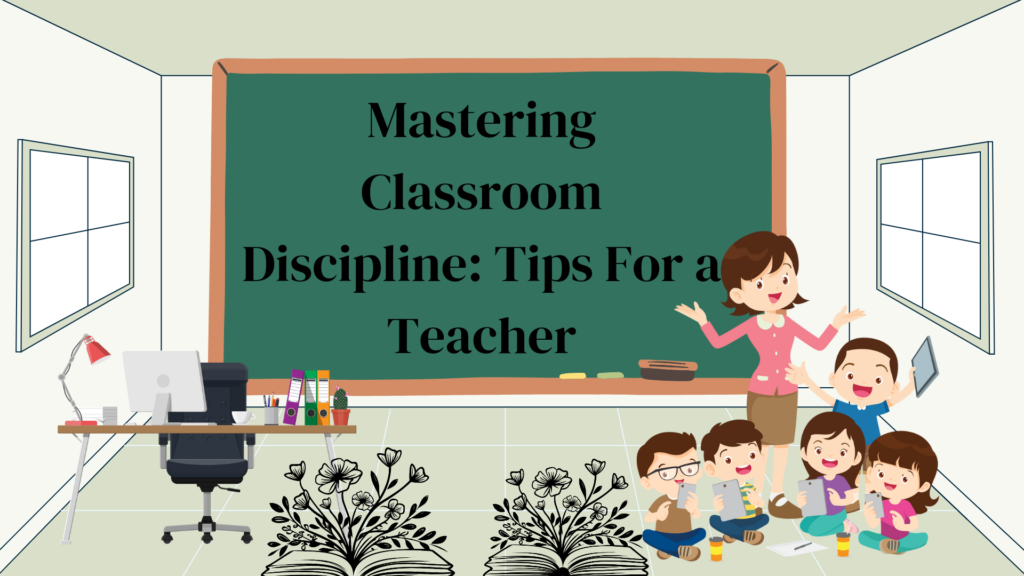

Mastering Classroom Discipline: Tips For a Teacher
Creating a positive learning environment is one of the biggest challenges teachers face today. Good classroom discipline is important for keeping order and encouraging student participation. In this blog, we will look at key strategies that every teacher should know to improve classroom discipline.
Understanding Classroom Discipline
Classroom discipline is often seen as just enforcing rules and punishing students. However, it is really about teaching students to respect boundaries and follow norms. A well-disciplined classroom creates a safe and productive space for learning. When students know what is expected of them, they are more likely to participate positively in their education. Therefore, it is important for every teacher to establish clear discipline strategies.

Establish Clear Expectations
Setting clear expectations is the key to good classroom management. Teachers should work together with their students to create rules. When students help make the rules, they feel more responsible and accountable. For example, if students are involved in rule-making, they are more likely to follow those rules. Additionally, putting these rules up on the walls in the classroom serves as a constant reminder of what is expected from them.
In addition, classroom management is an important part of teaching. If you are a teacher and need some strategies to manage you class. You can visit our website and read our blog. Click here to visit.
Implement Consistent Routines
Routines help create a structured environment where students know what to expect. Setting up daily routines, like how to start class or move between activities, encourages responsibility. For younger students, routines can include tasks like hanging up their coats and organizing their materials. On the other hand, older students might benefit from having a warm-up activity on the board when they enter the classroom. Having consistent routines helps reduce disruptions and keeps students focused on their learning.
Foster a Positive Classroom Environment
A positive classroom atmosphere is essential for good discipline. Teachers should work to create an environment where students feel safe, respected, and valued. This can be done by recognizing and rewarding positive behavior. Simple things like giving verbal praise or small rewards can encourage students to keep showing good behavior. Additionally, being friendly and approachable helps promote open communication and builds trust between teachers and students.
Use Proactive Behavior Management
Proactive behavior management involves anticipating potential disruptions before they occur. Teachers should identify common triggers for misbehavior and develop strategies to address them. For example, if certain students tend to become restless during long lectures, incorporating interactive elements can help maintain their attention. Additionally, using non-verbal cues, such as eye contact or proximity, can effectively redirect off-task behavior without disrupting the entire class.
Encourage Student Autonomy
Allowing students to make choices in their learning helps them feel more independent and responsible. When students can influence their learning process, they become more engaged and invested in their education. For example, teachers can give students options for project topics or let them choose their partners for group work. This sense of empowerment not only improves their decision-making skills but also strengthens the relationship between students and teachers.
Address Misbehavior Calmly
When students misbehave, it is important to address it calmly and in a helpful way. Teachers should not yell, as this usually causes more disruption. Instead, talking to the student privately and respectfully can help the student maintain their dignity while still emphasizing the importance of following classroom rules. Having a clear behavior management plan with set consequences helps students understand what will happen if they break the rules.
Promote Social Interaction
Setting aside time for social interaction can greatly improve the classroom environment. When students discuss current events or topics related to the curriculum, it helps them build communication skills and empathy. These informal conversations allow students to share their opinions while learning to appreciate different viewpoints. Additionally, these activities can also serve as team-building exercises that strengthen relationships among students in the classroom.
Conclusion: Your Path to Effective Classroom Discipline
As you think about these strategies, consider how you can use them in your teaching. Mastering classroom discipline is not just about enforcing rules; it is about creating a place where students can succeed both academically and socially. By setting clear expectations, building a positive atmosphere, and encouraging students to make choices, you can turn your classroom into a space of respect and engagement.
Remember, every teacher has the power to make a big difference in their students’ lives. Use these strategies, and watch your classroom grow and improve. If you want to learn more about effective classroom management techniques, think about joining our community for extra resources and support. Together, we can create a better learning experience for every student.
Barkha Sachdeva is a B.Com(Hons) graduate from Delhi University. Passionate about crafting content, she enjoys writing about fashion, beauty, technology, and travel. With three years of content writing experience, she possesses valuable insights and ideas in these domains.







Post Comment